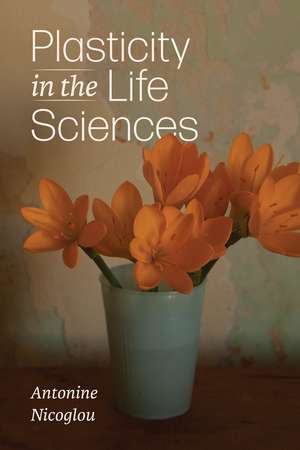Plasticity in the Life Sciences
Autor Antonine Nicoglouen Limba Engleză Paperback – 6 dec 2024
Plasticity has become an important topic in biology, with some even wondering if it has now acquired the theoretical importance in biology that the concept of the gene enjoyed at the beginning of the last century. In this historical and epistemological study, philosopher Antonine Nicoglou shows how the recurrence of the general idea of plasticity—throughout the history of the life sciences—indicates its essential role in the way we think about life processes. Although plasticity has become a key element in new evolutionary thinking, she argues, its role in contemporary biology is also not insignificant. Rather, as mobilized in contemporary biology, plasticity most often seeks to account for the specific nature of living systems.
The book is divided into two parts. The first takes up the history of plasticity from Aristotle to contemporary biology; the second part offers an original way of distinguishing between different phenomena described by “plasticity.” In the process, the author explores what has led some biologists to speak of plasticity as a way of overcoming genetic determinism.
| Toate formatele și edițiile | Preț | Express |
|---|---|---|
| Paperback (1) | 229.95 lei 3-5 săpt. | +14.11 lei 6-12 zile |
| University of Chicago Press – 6 dec 2024 | 229.95 lei 3-5 săpt. | +14.11 lei 6-12 zile |
| Hardback (1) | 675.08 lei 6-8 săpt. | |
| University of Chicago Press – 6 dec 2024 | 675.08 lei 6-8 săpt. |
Preț: 229.95 lei
Nou
Puncte Express: 345
Preț estimativ în valută:
44.00€ • 47.99$ • 37.10£
44.00€ • 47.99$ • 37.10£
Carte disponibilă
Livrare economică 03-17 aprilie
Livrare express 19-25 martie pentru 24.10 lei
Preluare comenzi: 021 569.72.76
Specificații
ISBN-13: 9780226837161
ISBN-10: 0226837165
Pagini: 320
Ilustrații: 16 halftones
Dimensiuni: 152 x 229 x 23 mm
Greutate: 0.46 kg
Editura: University of Chicago Press
Colecția University of Chicago Press
ISBN-10: 0226837165
Pagini: 320
Ilustrații: 16 halftones
Dimensiuni: 152 x 229 x 23 mm
Greutate: 0.46 kg
Editura: University of Chicago Press
Colecția University of Chicago Press
Notă biografică
Antonine Nicoglou is associate professor of philosophy of science at the University of Tours.
Cuprins
Introduction
Part 1. Concepts of Plasticity in the History of the Life Sciences
1. Theories of Plasticity in the Philosophy of Nature
2. The Plastic Embryo
3. The Emergence of an Operational Concept of Plasticity in Genetics
4. Plasticity in Evolutionary Biology: A Boundary Concept
5. Defining Plasticity
Part 2. Biological Plasticity: Two Ways to Explain Variation
6. Biological Plasticity, an Explanans in Developmental Process
7. Biological Plasticity, a Synonym for Biological Regulation?
8. Biological Plasticity, an Explanandum in Evolutionary Process
9. Plasticity in the Evolutionary Developmental Synthesis: Toward an Integration of Explanations?
10. Plasticity in the Life Sciences: Resistance or Recurrence
Acknowledgments
Notes
References
Index
Part 1. Concepts of Plasticity in the History of the Life Sciences
1. Theories of Plasticity in the Philosophy of Nature
2. The Plastic Embryo
3. The Emergence of an Operational Concept of Plasticity in Genetics
4. Plasticity in Evolutionary Biology: A Boundary Concept
5. Defining Plasticity
Part 2. Biological Plasticity: Two Ways to Explain Variation
6. Biological Plasticity, an Explanans in Developmental Process
7. Biological Plasticity, a Synonym for Biological Regulation?
8. Biological Plasticity, an Explanandum in Evolutionary Process
9. Plasticity in the Evolutionary Developmental Synthesis: Toward an Integration of Explanations?
10. Plasticity in the Life Sciences: Resistance or Recurrence
Acknowledgments
Notes
References
Index
Recenzii
“Sometimes metaphorical, sometimes concrete, from Aristotle to the modern-day, plasticity concepts have been invoked in theories of embryology, heredity, and organismic change with a multitude of meanings implicit in the use. Philosopher Antonine Nicoglou systematically and expertly guides the reader through a long and complex story.”
“Philosophers of biology have been increasingly interested in the concept of plasticity in recent years, but a detailed philosophical treatment of the topic has yet to appear. Nicoglou’s excellent book therefore fills a major need. Nicoglou traces the history of the concept of plasticity and its use in different biological disciplines from Aristotle to the present, bringing out a wide range of significant continuities and differences and illuminating the varying relation of plasticity to crucial concepts such as variation, diversity, novelty, adaptation, regulation, and more. As well as being an essential read for anyone interested in the lively contemporary discussions of plasticity, this is a fine example of the integrated historical and philosophical approach to understanding biology.”
